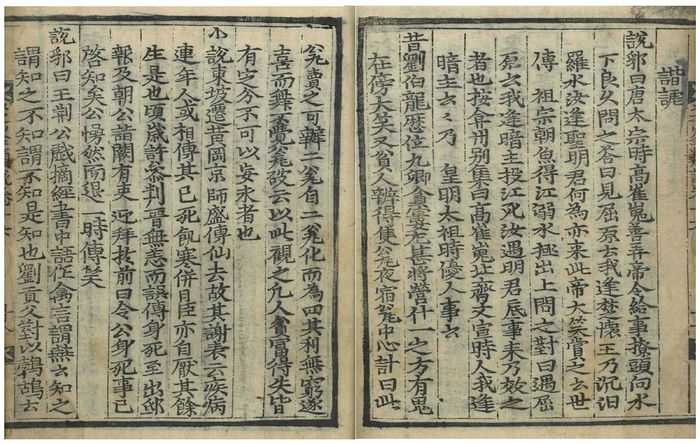"(Translation) 諧謔"의 두 판 사이의 차이
| (같은 사용자의 중간 판 2개는 보이지 않습니다) | |||
| 9번째 줄: | 9번째 줄: | ||
|Year = | |Year = | ||
|Key Concepts= | |Key Concepts= | ||
| − | |Translator = [[2018 Hanmun | + | |Translator = [[2018 Summer Hanmun Workshop (Intermediate)#Participants | Participants of 2018 Summer Hanmun Workshop (Intermediate Training Group)]] |
|Editor = | |Editor = | ||
|Translation Year = 2018 | |Translation Year = 2018 | ||
| 17번째 줄: | 17번째 줄: | ||
파일:해학2.JPG|* 諧謔 (해학, Witty stories)(2) | 파일:해학2.JPG|* 諧謔 (해학, Witty stories)(2) | ||
</gallery> | </gallery> | ||
| + | |||
| + | __TOC__ | ||
| 62번째 줄: | 64번째 줄: | ||
| − | [[Category:2018 Hanmun | + | [[Category:2018 Summer Hanmun Workshop]] |
[[Category:Intermediate Training Group]] | [[Category:Intermediate Training Group]] | ||
2018년 7월 19일 (목) 08:19 기준 최신판
| Primary Source | ||
|---|---|---|
 |
Title | |
| English | Witty stories | |
| Chinese | 諧謔(Witty stories) | |
| Korean(RR) | 해학 | |
| Text Details | ||
| Genre | ||
| Type | ||
| Author(s) | Yi Su-gwang 李睟光 (Chibong yusŏl 芝峯類說) | |
| Year | ||
| Source | ||
| Key Concepts | ||
| Translation Info | ||
| Translator(s) | Participants of 2018 Summer Hanmun Workshop (Intermediate Training Group) | |
| Editor(s) | ||
| Year | 2018 | |
Original Script
-昔有一將官畏妻者。以爲天下之貞男。莫我若也。欲試諸人。乃植靑白兩旗於庭。令曰。貞男者赴靑旗。非貞男者赴白旗。於是軍中或左或右。有一卒獨中立不動。怪而問之。對曰。卒妻甞戒卒曰。男子眾會。則必談及女色。愼無往云。故不敢違耳。將官乃下庭。挽而上座曰。今日之事。爾爲將矣。
-有士人畜一妻一妾而摘白鬚者。妾拔白唯謹。而妻惡其欲媚於妾也。去其黑者。一朝白黑俱盡。儼一老婆。經歲不敢出焉。 《芝峯類說.卷十六》
Translation
Student Translation : (Kyrie)
In the past, Yu Paekyong [1] successively served as each of the nine ministers. [2] He was extremely poor. He was going to operate (a business) as a way to get one tenth. There was a ghost close by who laughed heartily. It is said that a poor man owned one jar. At night he slept inside the jar. In his mind he calculated and said: "If I sell it I can get two jars. Certainly the two jars can transform and become four jars. Its profits will be endless." Therefore he was happy and danced. Without realising what he did the jar broke. Considering this, in general people's poverty and wealth, and acquisitions and loses all have their fixed share and are things which cannot be recklessly pursued.
Once their was a general who feared his wife. He thought, "Of the faithful men in the world, no one is like me." He wanted to test it among other people. Therefore he set up two flags, blue and white, in the courtyard. He gave an order saying, "Those men who are faithful, go to the blue flag. Those men who are not faithful, go to the white flag." At this, among the soldiers some went left and some went right. There was one soldier who stood alone in the middle and did not move. The General thought it strange and asked him. The soldier replied and said: "My wife once warned me and said: 'If a crowd of men gather then the talk will necessarily reach the topic of women. Be careful that you don't go there.' For this reason I do not dare to disobey, and that's why." The General thereby went down to the courtyard. He pulled the soldier to the upper seat and said: "In regards to today's matter, you become the General."
Once there was a literati who kept one wife and one concubine and he had them pluck his white hair. The concubine carefully plucked only the white ones, but the wife hated that he wanted to charm the concubine. So she removed the hairs that were black. In one morning the black and white hairs were all gone. He looked like an old granny. For an entire year he was not brave enough to go out of there.
- Discussion Questions:
+In class we translated 將營什一之方 as "He was about to run a business that would bring him a 1/10 margin," but when I look at the characters I cannot find anything referring to a business or to what the 1/10 refers. Is this all understood from the meaning of 營?
(Petra) 營 reffers to 'to run a business', 什一 refers to the '1/10' - 什's meaning is the same as of 十.
(Kyrie) 1/10 of what though?
(JG) I understand it as a 10% profit, a 1/10 margin of profit.
[Julian] Just an aside—I think it's "not brave enough to go outside" here.
- I'd say we can take 敢 as 'to dare to...', hence, "He would not dare to go out".
(Kyrie) Thank you. I added "not."
(YO) 莫我若也, like 莫我如也, has the sense of "no one is as good as me / no one is better than I".
